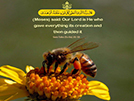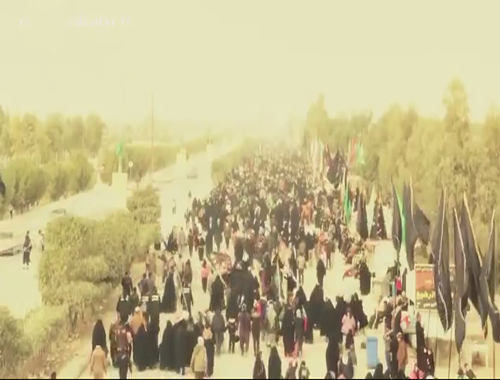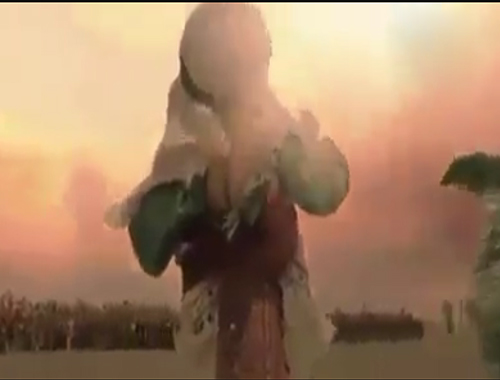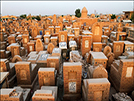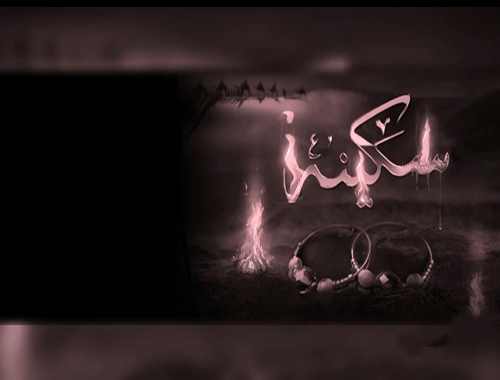Verses6-12
- Details
- Hits: 2671
Sura Infitar
(The cleaving Asunder)
No.82 (Verses 6-12)
(6) يَا أَيُّهَا الْإِنسَانُ مَا غَرَّكَ بِرَبِّكَ الْكَرِيمِ
(7) الَّذِي خَلَقَكَ فَسَوَّاكَ فَعَدَلَكَ
(8) فِي أَيِّ صُورَةٍ مَّا شَاءَ رَكَّبَكَ
(9) كَلَّا بَلْ تُكَذِّبُونَ بِالدِّينِ
(10) وَإِنَّ عَلَيْكُمْ لَحَافِظِينَ
(11) كِرَامًا كَاتِبِينَ
6. O Man! What has seduced you (away) from your Lord, the Gracious?
7. Who created you and fashioned you, and proportioned you in perfection?
8. In whatever form He pleased, He constituted you.
9. Nay! but you disbelieve in the (day of) reckoning.
10. And surely there are Watchers over you,
11. Honourable scribes:
12. They know (and understand) whatever you do.
Commentary:
O Man! What Has Seduced You?
Concerning the previous verses about the Resurrection, the following verses; to awaken Man and to direct his attention to the responsibility of that which Allah expects of him, the Qur'an kindly questions in an intensive scornful tone and says:
O Man! What has seduced you from your Lord, the Gracious?
Here, 'Man' is mentioned for the sake of his humanity, which is a privilege of his over all other creatures in the world. Then he is in the presence of Allah, Who is both Lord and Gracious. Because of His Lordship He supports Man and undertakes his training and improvement; and because of His Graciousness, He bestows innumerable material and spiritual blessings on him without expecting repayment or reward. He even overlooks his mistakes and forgives him.
Is it appropriate for this noble creature to be bold and disgraceful to such a great Lord?
Or, is it right for Man to be neglectful of Him and not to obey His instructions that guarantee his own happiness?
That is why a narration from the Prophet (p.b.u.h.) for this commentary of the verses says: His ignorance has caused him to be proud and neglectful.
This statement makes it clear that the main purpose is that by relying on His Lordship and Graciousness, the pride and negligence of Man is removed.
The term /qarraka/ is based on the term /qurur/ which originally means 'negligence in wakefulness' ; or, in other words, negligence where Man should not be neglectful. Since negligence sometimes becomes the source of 'boldness' or the feeling of 'self-importance', the term /qurur/ has been interpreted in these senses. Satan is called /qarur/ because he seduces Man with temptations and causes him to be neglectful and bold.
In commenting on the term /karim/, various interpretations have been cited:
Some have said that /karim/ is used for 'gracious one'; that all his actions are beneficent and he seeks for neither gaining benefit nor parrying loss.
Some others have said that /karim/ means 'one who donates what is for him to donate and what is not'.
Still others have said that /karim/ is 'one who pays a lot for a little'.
However, in fact, all of these commentaries are gathered together in the essence of the term when it refers to the utmost graciousness of one, such as Allah; the most Gracious, Who not only forgives the sinners, but also changes their sins into good deeds (for those who deserve forgiveness).
There are some wonderful statements from Amir-al-Mo'mineen Ali (p.b.u.h.) in commenting on the verse. In the following one, he says: The addressee (in this verse) is devoid of argument and his excuse is most deceptive. He is holding himself in ignorance.
O Man! What has emboldened you to (commit) sins; what has deceived you about your God and what has made you satisfied with the destruction of yourself? Is there no cure for your ailment or no awakening from your sleep? Do you not have pity on yourself as you have on others? Generally, when you see anyone exposed to the heat of the sun you cover him with shade, or if you see any one afflicted with grief that pains his body you weep from pity for him. What, then, has made you patient over your own disease? What has made you firm in your own affliction, and what has consoled you from weeping for yourself although your life is the most precious of all lives to you? And why does not the fear of an ailment, that may befall you in the night, keep you wakeful although you travel on the road to Allah's wrath due to your sins?
You should cure the disease of languor in your heart by determination, and the sleep of neglectfulness in your eyes by wakefulness. Be obedient to Allah, and love Him in remembrance, and picture yourself, running away when He is approaching you. He is calling you to His forgiveness and concealing your faults with His kindness, all the while you are fleeing away from Him toward others.
Certainly, Allah is Great; the Powerful, Who is so generous, but how humble and weak are you and yet so bold to commit disobedience to Him although you live in His protection and undergo changes of life in the expanse of His kindness.... (1)
Then to awaken the neglectful Man, in four steps it points to a part of Allah's favour and says:
Who created you and fashioned you, and proportioned you in perfection.
* * * *
In whatever form He pleased, He constituted you.
Thus, the Qur'an mentions four great stages in the Creation of Man, viz: the creation itself, the fashioning of him, his proportion afterward, and, finally, the constitution of Man.
The first stage in the creation of Man is from the lowly life-germ in the darkness of the mother's womb.
The second stage is his fashioning in a just form and with appropriate limbs in an astonishing regular formation. Eyes, ears, heart, blood vessels, and other organs of the body are created so surprisingly that if Man thinks about their structures and regularities and understands Allah's Beneficence to him, each of them will be illustrated as a world of knowledge and power that Allah granted Man, because of His Favour and Graciousness.
These are the Divine gifts that natural scientists have been thinking over, working on, and writing about for thousands of years, but they are still at the threshold.
The third stage is proportioning Man and adjusting his faculties as well as his organs, and then, their internal coordinations and relations with each other.
The parts of Man's body are created mainly symmetrically: hands, feet, eyes, ears, some bones, vessels and muscles are in pairs on both sides of the body.
Besides, different organs and limbs cooperate with each other to accomplish their functions, for instance, the respiratory system complements the circulatory system and vice versa. In swallowing a little piece of food, teeth, tongue, salivary glands, and muscles, around the mouth and throat, work together until the morsel enters the digestive system. Henceforth, too, many other coordinations occur until the food is digested and absorbed, and subsequently, the required nutrition and vitality is supplied. These processes totally are reflected in the phrase /fa'adalaka/ 'and proportioned you in perfection'.
Some have interpreted this phrase in the sense of Man's 'standing errect', his virtue and rank in comparison with other kinds of animals, which corresponds more with the latter stage, but the former meaning is more comprehensive.
Finally, the formation and constitution of Man in comparison with other living creatures comes forth. Comparing him with them, he has well-balanced features, good character and an awakened nature, which is alert and capable of accepting any training and knowledge.
Besides, the contenances of men are different as it is mentioned in Sura Rum, No.30, verse 22 which says: And among His Signs is the creation of the heavens and the earth, and the variation in your languages and your colours...
In addition to the external differences, there are many internal ones, as well, such as talents and tastes which are organized and arranged in some forms that requires only His knowledge, to establish a safe and sound society, complete for all of them; to supply the required necessities, and the internal and external powers of men to be complements of each other.
On the whole, Allah has created Man in the best of moulds, as Sura Tin, No. 95, verse 4 says: "We have indeed created Man in the best of moulds."
In short, through the above verses, as well as in many other verses of the Qur'an, Allah wants the forgetful arrogant Man to try to know himself. He should research his existence from the very beginning, which means his creation in his mother's womb to the time when he is born, and from then until he matures and develops, in order to understand that in every stage and at every moment he has been receiving abundant new blessings from his Great Lord, and not to be neglectfully arrogant; by accepting His Lordship, worships Him.
* * * *
Then, the Qur'an refers to the origin of their neglectful arrogance and says:
Nay! but you disbelieve in the (Day of) reckoning.
Neither Allah's generosity nor His kindness is the origin of your carelessness, but the lack of belief in the Day ofjudgment is the main cause for your arrogance.
Verily, when we seek deep into the souls of most neglectful arrogant ones we find doubt and denial of the Hereafter within them, while all their other words and deeds are mere excuses. That is why the more the basis of faith and belief in the Resurrection, in those hearts, are strengthened, the less this negligence and carelessness will remain there.
The term /din/, in this verse, means 'punishment' and the 'Day of Reckoning', and that some have suggested 'Islam' as a probable meaning of it seems inappropriate, because the main theme of the verses, here, is Resurrection.
* * * *
Then, in order to remove the factors effective in arrogance and carelessness and to strengthen the belief in the Resurrection, it says:
And surely there are Watchers over you,
* * * *
Honourable scribes.
* * * *
They know (and understand) whatever you do.
The term /hafizin/, used in the above verse, means 'some special angels who are scribes for the good and evil deeds of men, and with protection preserve them'; the ones who are called /raqib/ 'watcher, guardian', and /'atid/ 'ready' in Sura Qaf, No.50, Verse 18 which says: Not a word does he utter, but that there is a sentinel over him, ready (to note it). And, also, in the same Sura verse 17 says: When the two receivers (guardian angels) receive (his doings and note them) one sitting on the right and one on the left.
Some other verses of the Qur'an point to the existence of these guardian angels, too.
Undoubledly, Allah, sooner and better than anyone else, is a watcher and a witness to Men's deeds, but, for emphasis and to make men feel their responsibility more acutely, He has appointed, over them, a number of angels that witness, some of which are the very ones that we have spoken about.
In addition to them, there are other protectors who have surrounded Man from every side, all of whom, by the name of 'witnesses of the Hereafter,' are categorized in seven divisions:
The first witness is Allah Who says: ...and whatever deed ye (Mankind) may be doing, We are Witnesses thereof..., Sura Yunus, No. 10, verse 61).
The second are the prophets and the vicegerents of the prophets: How then if We brought from each Prophet a witness, and We brought thee as a witness against these (people), (Sura Nisaa, No 4, verse 41).
Then, the tongue, hands and feet or Man's limbs, in general, are witnesses: On the Day when their tongues, their hands, and their feet will bear witness against them as to their actions,( Sura Nur, N0. 24, verse 24).
Another witness is Man's skin: They will say to their skin: 'Why bear you witness against us?', (Sura Ha-Mim, N0. 41, verse 21).
Angels are witnesses as stated in (Sura Qaf, N0. 50, verse 21), and as the verse above denotes.
The land on which Man lives and commits good or evil deeds is a witness: On that Day will she (the Earth) recount (all) her news, (Sura Zilzal, No. 99, verse 4).
And the final classification of witnesses is the time when the actions are done. It bears witness, against Men, that they have committed certain deeds in their life.
Tabarsi cites in his book 'Ihtijaj' that once someone asked Imam Sadiq (p.b.u.h.) what the reason was that there are some appointed angels for scribing Man's good and evil deeds when it is known that Allah is aware of all things irrespective of their being obvious or hidden. He answered: Allah invited those angels to His worship and appointed them as witnesses over His servants in order that they be the most careful of their obedience to Allah and least committers of sin because of the angel's presence. There is many a servant who decides to commit a sin, but when he remembers their presence he stops and says: 'My Lord sees me and the angels are appointed to witness the deeds.' Moreover, Allah, with His Grace, kindly appointed them, by His leave, to protect the servants from stubborn Satans by banishing them and also to keep the servants safe from numerous harmful animals and pests of the land, which are not seen until the time when Allah orders it and the end of their lives has come. (2)
It is clearly understood from this narration that angels, in addition to being scribes for Man's deeds, protect him against unpleasant events, pests, and Satans' temptations.
It is noteworthy that in the above verses these angels are characterized as 'Honourable Scribes' in order to make Man aware of being more careful about his own deeds, because the higher position the watchers of Man's deeds have, the more careful Man is before them and is more ashamed of committing sins.
The term 'scribes', used in this verse, is for emphasis, in that they are not satisfied with only memorizing the actions, but they also record them all precisely and then nothing will be left unrecorded or ommitted; from the smallest item to the largest.
And the sentence: 'They know (and understand) whatever you do', is also another emphasis on this fact that they are perfectly vigilant of everything you do and their record is completed according to the same knowledge.
By the way, all these details denote to Man's free-will, because if Man were not free there would be no reason or aim for appointing these guardian angels or for their records which contain so much information and warnings for him.
On the other hand, all of the details make this fact clear that the divine punishments and rewards are very severe and serious, since Allah has counted them extremely important for Mankind.
Regard for this fact and believing in it are enough to train Man and make him familiar with his responsibilities and, consequently, keep him far away from evils and corruptions.
* * * *
Explanation:
The Angels; The Scribes:
Not only in the above verses, but, also in many other verses of the Qur'an and in Islamic narrations, this idea has come to light that Allah has appointed some angels to protect Man and to scribe his deeds, both good and evil, preparing his record for the Day of Judgement.
In the Islamic narrations there are some meaningful qualities mentioned about these angels as a warning to Man, among which are the following:
1. Someone asked Imam Musa-ibn-Ja'far (p.b.u.h.), Are the two angels, appointed for recording Man's deeds, aware of his intention and inner decision when he wants to do a good or an evil action?
Is the odor of sewage and perfume the same? Imam (p.b.u.h.) asked him and he answered: No. Imam (p.b.u.h.) then told him: When a person decides to do a good action, his breath becomes sweet. The angel on his right (the scribe of the good deeds) tells the angel on his left to stand up, because he has intended to do good; and when the person fulfills it his tongue, as a pen, and his saliva, as the ink, are used by the angel to record it. But, when he decides to do an evil action his breath becomes fetid, and the angel on his left tells the angel on the right to stand up, because he has intended to do evil. And when he concludes the act his tongue, as a pen, and his saliva, as the ink, are again used by the angel to scribe it. (3)
This tradition clearly indicates that Man's intention affects his whole entity and angels will be informed of his inner secrets by his outer signs. Certainly, they could not scribe the deeds correctly if they were not aware of Man's intentions, because the value of an action relates fully to the kind of intention Man has. The Prophet (p.b.u.h.), too, in his famous tradition likewise concurred.
Another thing that is understood from the above tradition is that some means, which are used for Man, are taken from himself.
2. The guardian angels are to note down a good deed on the record when the person intends to do good, and when he fulfills it they scribe it ten-fold, but when he intends to commit sin they will not note it down until he fulfills the act, then they scribe only one strike against him.
This shows the Grace and Mercy of Allah for Man. He forgives him his intention of doing sin and the punishment of the sin is equal according to Justice, but He gives him a good-deed for each intention of obedience, and rewards him according to His Graciousness not to His Justice. This encourages Man to do good.
3. Another tradition from the Prophet (p.b.u.h.) says that he, after pointing to the two Guardian angels who scribe each good action of a servant ten-fold, said: When a person does an evil, the angel on the right tells the angel on the left not to hasten in scribing the sin, he may do a good action which covers the sin, since Allah says: '...these things that are good remove those that are evil...'(Sura Hud, No. 11, verse 114), or he may repent... . Then the angel appointed to scribe evils waits about seven hours to see whether he does a good action or repents, if not the angel on the right tells him to note the evil action down in his record. (5)
4. Another narration from Imam Sadiq says: When the believers are sitting in a private meeting and speaking together, the Guardian Angels tell each other that we should leave them alone. Perhaps the believers are discussing something secret that Allah has concealed. (6)
5. Hazrat Ali (p.b.u.h.) advises people toward piety (taqwa) and says: Know, O' creatures of Allah! that your ownself is a guard over you; your limbs are watchmen and truthful vigil-keepers who preserve (the record of) your actions and the numbers of breaths you take. The gloom of the dark night cannot conceal you from them, nor can closed doors hide you from them. Surely tomorrow is close at hand....(7)
(1) Nahj-ul-Balaqa, Sermon No. 223 (Arabic Version), No.227 (English Version).
(2) Nur-uth-Thaqalayn,vol. 5, p. 522.
(3) Usul-i-Kafi, vol. 2, Chapter: Good or Evil Action, Tradition 3.
(4) Ibid., Traditions 1 and 2.
(5) Usul-i-Kafi, vol. 2, Chapter: Good or Evil Action, Tradition 4.
(6) Ibid., based on Nur-uth-Thaqalayn, vol. 5, p. 110.
(7) Nahj-ul-Balaqa, Sermon No.157 (Arabic Version), No. 160 (English Version).


